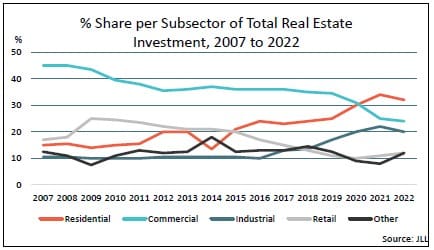Why is the South African real estate industry important?
Contents [hide]
- Introduction
- The Importance of Real Estate in South Africa
- The Top 3 Challenges Facing the South African Real Estate Industry
- The Housing Shortage
- The Growth of Informal Settlements
- The Lack of clear Property Rights
- How Government Policy is Impacting the South African Student Accommodation Market.
- Real Estate Agents Opportunity
- Conclusion
Introduction
Given the number of research organisations and publications, one would be stating the obvious by emphasising the importance of the real estate industry to the South African economy.
Amongst all these publications, the WOW report on Real Estate Activities in South Africa makes for interesting reading. It unearths a few statistics that are of particular interest with respect to the industry’s subsectors. It also showcases an industry that is complex and dynamic, influenced by a range of economic and policy factors, and provides for many real estate opportunities
The importance of the real estate industry in South Africa
The South African real estate indsutry can be subdivided into 5 categories. The graph across, depicts the relative importance of these categories on a global scale and also shows the change that occurred over time, especially with regard to the commercial sub-sector. Government policy in the South African real estate sector has been reviewed to address issues of land reform, with building regulations having a significant impact on the industry.

The government has also introduced a range of initiatives aimed at promoting affordable, social and subsidised housing to stimulate economic growth in the sector.
The Top 3 Challenges Facing the Real Estate industry
The South African real estate industry is facing a number of challenges, including:
- A housing shortage.
- The growth of informal settlements.
- The lack of clear property rights.
There is no real shortage in the commercial and industrial property subsectors which were less affected in construction activity than the housing market by the economic paralysis of the lockdowns and subsequent surge in demand. The housing market saw a substantial increase in backlogs, and activity increased climbing post-COVID, although hobbled to some extent by a more challenging environment. The numbers and changes in activity stated in the WOW report reflect what can be expected of the performance of housing real estate and other subsectors against the broader economic background, and how well South Africa is doing on that front.
While the housing sector is growing and there is a high demand, this sector is still a problem child in the country’s economic equation.
The Housing Shortage
Approximately 13.5% of households live in informal dwellings and there is a public housing unit backlog of 4 million units according to WOW’s report. These households are in 2,700 informal settlements, the majority of which are located on unsuitable land. Of South Africa’s 121.9 million hectares of land, 23% is unregistered and registered state land and can be utilised for housing settlements.
Before considering the backlog and the enormous investment required, it is important to note that there are less-costly solutions that can be achieved through policy and implementation plans.
The Growth of Informal Settlements
The growth of informal settlements is a major challenge facing the South African government, which has a number of initiatives in place to address the problem, which have so far been unsuccessful.
The Lack of Clear Property Rights
In Hernando de Soto’s book: The Mystery of Capital (2000) he remarks that undisputed, well-documented, and unencumbered property rights are the cornerstone of wealth creation for individuals as they allow owners of property to unlock capital inherent in the value of the property asset for productive purposes, and in the process, create wealth for themselves.
This argument brings into sharp focus the need to fast-track the awarding of title deeds of property held and/or occupied by its owners. So far 28,825 properties were registered in 2021. However, the Department of Human Settlements (DHS) needs to register 388,000, which it announced would be done in the next three years. The department has partnered with the Banking Association of South Africa to fast-track the delivery of title deeds to housing beneficiaries. This will be done by utilising the Youth Employment Services programme as stated in the WOW report.
Secondly, the system of traditional land with only a “permission to occupy” system does not meet the requirements to enable the occupant/owner to monetise the property, and needs amendment to unlock capital.
Thirdly, government’s policy to return assets to the disadvantaged should not be construed as a halfway house with long leases and an option to buy. This does not amount to full unencumbered ownership and debilitates the capacity to unlock capital from the asset.
The overall housing backlog is an almost intractable challenge in the short to medium term. Budget commitments need to be made annually to gradually address the backlog. This budget provision should also take into account the required supporting infrastructure such as roads, sanitation, and power. Regardless of the budget constraints, failure to do so will continue to aggravate the tense social circumstances. Shelter is ranked as a fundamental need according to Maslow’s hierarchy of needs, for good reason.
Government Policy is Impacting the Student Accommodation Market
While there was always a shortage of student accommodation, demand has increased with the introduction of free tertiary education
The free enrolment at tertiary education institutions saw a massive increase in applicants, aided by the National Student Financial Aid Scheme (NSFAS), established to fund needy students. Today the scheme assists about 900,000 students with an allocated budget of R49bn.
The supply of student accommodation has lagged behind enrolment levels. It takes time to build real estate infrastructure, creating a huge supply shortfall. In another WOW report on the accommodation sector, this issue was dealt with in more detail. This real estate need is in addition to residential housing accommodation needs.
Real Estate Agents Opportunity
This subsector is a wonderful occupation in a wide market of opportunities to earn an income. Sadly, regulations have put up considerable barriers to entry. Previously, the requirements to start an agency or enrol with one on a commission basis were not as onerous as they are today. In an economy with such high unemployment, one wonders if there would not be merit in relaxing some of the rules and registration requirements.
Conclusion
The South African real estate industry is complex and dynamic. It is facing a number of challenges, including a housing shortage, the growth of informal settlements and the lack of clear property rights. Government is working to address these challenges, but it will take time to make a significant difference.
Despite the challenges, there are a number of opportunities in the South African real estate industry such as growing demand for student accommodation and for retirement homes.
The Real estate industry is a key driver of the South African economy. It is important for the government and the private sector to work together to address the challenges facing the sector and to seize the opportunities that exist.
Contact us to access WOW's quality research on African industries and business
Contact UsRelated Articles
BlogCountries Real estate activitiesSouth Africa
How technology has changed the real estate industry
Contents [hide] Digital transformation in the real estate industry Technology is pervasive in all spheres of our lives and the property industry is no exception. It has enabled the real...
BlogCountries Real estate activitiesSouth Africa
Is Digitisation and Working from Home Disrupting the Real Estate Sector?
This blog is written at a time when the Real estate sector in South Africa is facing another big knock caused by the massive unrest and looting taking place at...
BlogCountries Real estate activitiesSouth Africa
Real Estate Activities in South Africa
If you’d like to find out more about South Africa’s real estate activities, purchase the full report or feel free to download and share the free infographic below.





